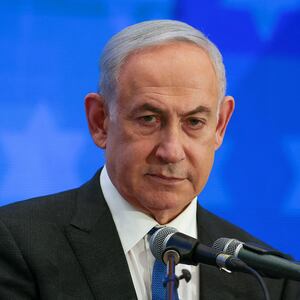The U.S. has submitted a draft resolution to the U.N. Security Council calling for an “immediate” ceasefire in Gaza, Secretary of State Antony Blinken said Wednesday, after months of repeatedly blocking similar calls.
Speaking in an interview with Saudi news channel Al-Hadath, Blinken said Washington, D.C. is now pressing for a ceasefire “tied to the release of hostages” being held by Hamas. He said that the resolution would send a “strong signal” and that while the U.S. supports Israel’s right to defend itself, “it’s imperative that the civilians who are in harm’s way and who are suffering so terribly—that we focus on them, that we make them a priority, protecting the civilians, getting them humanitarian assistance.”
Blinken was asked about how the U.S. is pressuring Israel to protect civilians while still supplying American arms and finances to Jerusalem, as well as vetoing any resolution that calls for a ceasefire at the U.N. Since the conflict erupted in October, the U.S. has vetoed three such resolutions, including one last month that attracted wide support—including from the U.S.’ allies, though Britain abstained—on the grounds that it could jeopardize negotiations involving Qatar, Egypt, and Israel to secure the hostages’ release.
Of the negotiations, which are still yet to secure a new truce, Blinken said an agreement is “getting closer” and that the “gaps are narrowing.” “I believe it’s very much doable, and it’s very much necessary,” he said. “And of course, if Hamas cares at all about the people it purports to represent, then it would reach an agreement, because that would have the immediate effect of a ceasefire, alleviating the tremendous suffering of people, bringing more humanitarian assistance in, and then giving us the possibility of having something more lasting.”
He also reiterated the Biden administration’s opposition to Israeli Prime Minister Benjamin Netanyahu’s stated goal of invading the southern Gaza city of Rafah. Blinken said there is “no effective way” of getting the 1.4 million Palestinians currently sheltering in the city to safety ahead of such a ground operation, and that an Israeli team will travel to the U.S. next week to hash out a “different way of dealing with the remaining problem of Hamas in Rafah,” though he declined to provide details on what alternative options could be considered.
Blinken’s comments came amid reports Wednesday that the U.S. has received written assurances from Israel claiming that its use of American-made weapons in Gaza is not breaching humanitarian laws. The State Department now has until May to assess if the assurances are “credible and reliable” and report to Congress, as per a national security memorandum President Biden issued last month. Biden could halt arms transfers to Israel if the credibility of the assurances is called into question.
Human Rights Watch and Oxfam submitted a joint memorandum to the U.S. government on Tuesday alleging that Israel is using American weapons and blocking U.S.-funded humanitarian aid in Gaza in violation of international humanitarian laws and that any Israeli assurances to the contrary “are not credible.” The organizations said they had “observed or documented” indiscriminate and disproportionate attacks, the collective punishment of civilians, and the use of “starvation as a weapon of war.”
Israel denies breaking international law.
Nearly 32,000 people have been killed in Gaza—according to Palestinian health officials—over the course of the five-month conflict, which was launched in response to Hamas’ Oct. 7 attacks that Israeli officials say killed 1,200 people. U.N. Secretary General Antonio Guterres this week demanded that Israel allow humanitarian aid into the enclave after a report warned of an imminent famine, with Guterres calling the crisis “an entirely man-made disaster.”







